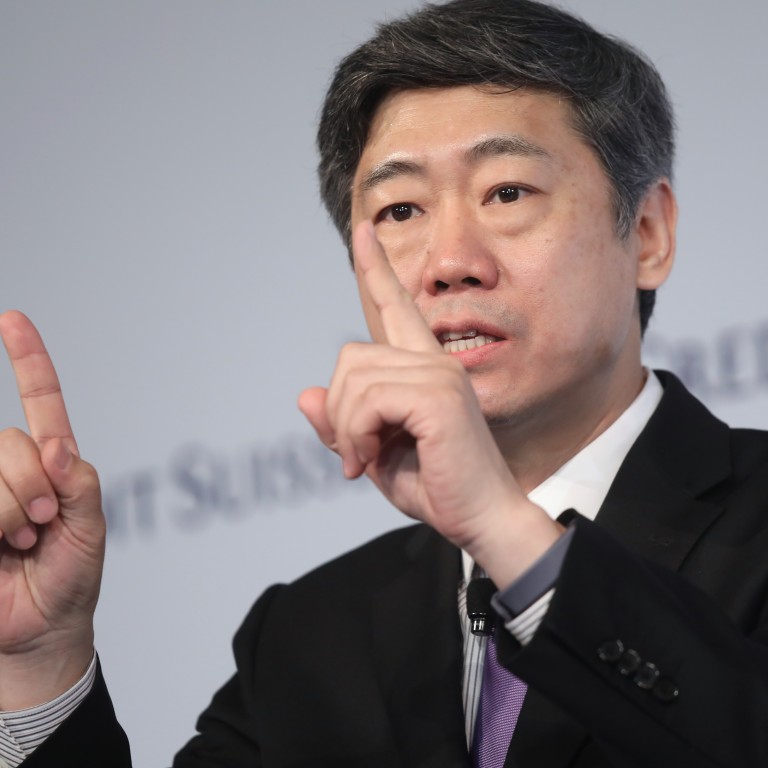
China academics accelerate efforts to promote Beijing’s government-led economic model
- Academics have launched the Journal of Government and Economics, an English-language publication that seeks to explore the proper roles of government and free markets in economic development
- Beijing’s confidence in its economic decision-making has grown, given its ability to withstand the impacts of the US trade war and coronavirus shock
China’s leading academic institutions are accelerating efforts to promote the study of the role of government in economic development, given that the nation’s own government-led rise in the last 40 years has been hailed internally as a miracle but interpreted by many Western countries as state capitalism.
Late last month, leading academics launched the “Journal of Government and Economics”, an English-language publication that seeks to explore the proper roles of government and free markets in economic development.
“China’s development in the past 70 years has conveyed a basic lesson: we must handle government-market relations well,” said David Daokui Li, who founded the Academic Centre for Chinese Economic Practise and Thinking and the Society for the Analysis of Government and Economics at Tsinghua University.
This new discipline is set to broaden the vision of international economic research, let the rest of the world better understand China and accordingly accept some of China‘s effective methods
Li, who received his PhD from Harvard and was a member of staff at the University of Michigan in the 1990s, now serves as co-editor of the international journal with Eric S. Maskin, a Harvard professor and Nobel Prize laureate.
“This new discipline is set to broaden the vision of international economic research, let the rest of the world better understand China and accordingly accept some of China‘s effective methods,” Li was quoted as saying in the statement on the society’s WeChat account.
Many Western researchers have attributed China’s economic rise to state-controlled capitalism and view it as a threat to free markets given its top-down central plan.
In particular, Western scholars and governments have argued that Chinese state-owned enterprises already have significant advantages – such as easy access to low cost financing and land – that gives them a major advantage over private businesses in China.
“What gives this state capitalist system such immense global force are the synergies and interconnectivity between and among Chinese firms, state-owned banks and investors, and the Chinese Party-state,” he wrote in an article in January.
He added that Washington should begin a conversation on creating its own market-friendly industrial policy and create a coalition of like-minded market economies to “blunt Chinese economic coercion”.
Beijing has spent decades shifting away from the Soviet-style command economy and moving toward a market economy, although China has not gone far enough in the eyes of the US or the EU.
China’s leadership has hailed the socialist market economy as a key factor to the country’s economic success, and reiterated the need for economic restructuring and further market opening.
Drawn on the common issues faced by developing countries, it can better help them grasp the development opportunities and solve their problems
“The leadership of the Communist Party and the socialist system are the preconditions for China’s development of a market economy,” President Xi Jinping said in a speech in 2016, the full text of which was only made public last year.
“We need both an ‘efficient market’ and ’proactive government’.”
The study of New Structural Economics, an economic development theory that combines elements of classical free market economics while stressing on the role of government, has gained prominence in China in recent years.
“Drawn on the common issues faced by developing countries, it can better help them grasp the development opportunities and solve their problems,” advocate Justin Yifu Lin, a former World Bank chief economist and who is now a professor at Peking University, told an online seminar last week.
The approach that China has taken in developing its own model suggests the China model can’t simply be exported
Research on New Structural Economics has accelerated, with 20 Chinese universities having already established relevant institutes since 2017 and another 10 in the process doing so.
Isabella Weber, an assistant professor at the University of Massachusetts Amherst, said developing nations trying to catch up economically tend to use strong state intervention combined with direct planning and the participation of state entities in the market, providing greater capacity than Western governmental models to handle many emergency events.
Despite this, Weber said other countries must consider their local conditions before adopting China’s development theory.
“The approach that China has taken in developing its own model suggests the China model can’t simply be exported,” said Weber, author of How China Escaped Shock Therapy: The Market Reform Debate.
“I do not think that there is a Beijing Consensus that can replace the Washington Consensus as a blueprint for development policy.”

